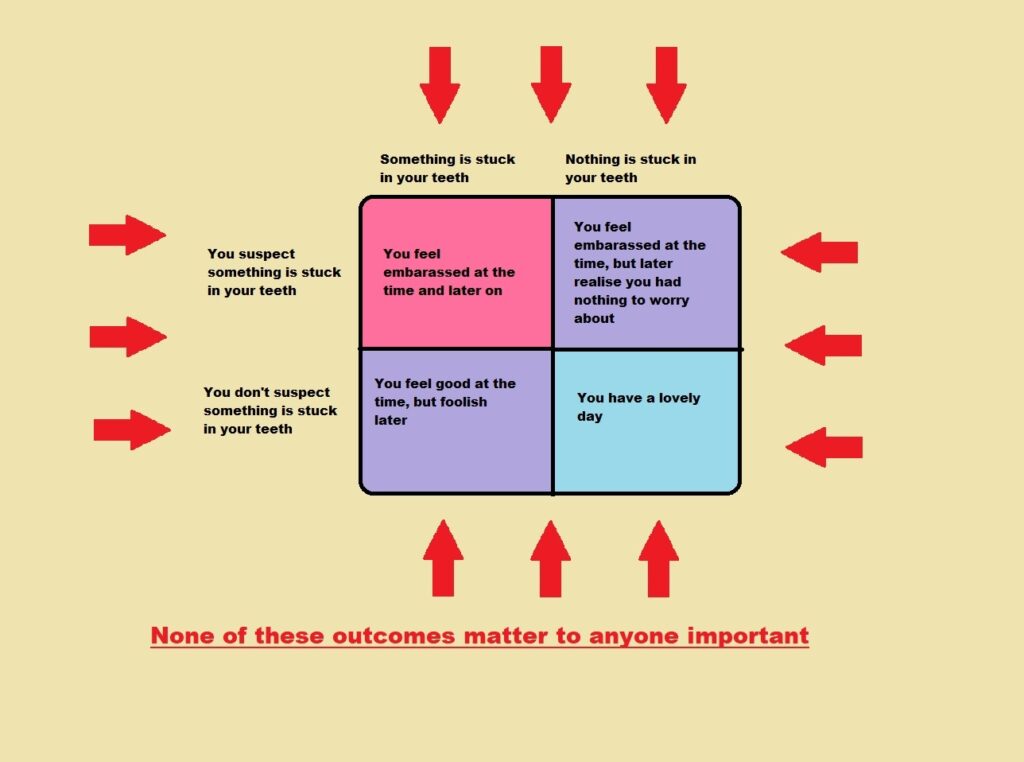So, let them bring on all their problems – I’ll do better than my best
I have confidence they’ll put me to the test – But I’ll make them see I have confidence in me
I Have Confidence, from The Sound of Music: Rodgers and Hammerstein, 1965
To succeed in audio, having the right amount of confidence is key. I struggle with a lack of confidence, and this post will mostly deal with how I counteract that. However, if you think you’re god’s gift to sound, you might want to take a minute to reflect on whether that’s true too, especially if your bragging is overcompensation for low-esteem. Being realistic about your abilities, and having a mindset somewhere between Marvin the Paranoid Android from the Hitchhiker’s Guide to the Galaxy and the average Pop Idol contestant is the goal.
Plenty of aspects of this job can knock your confidence: as a freelancer, it’s easy to constantly compare yourself to others. As I mentioned in my last post, social media can be toxic; when all you see is the best aspects of your peers’ lives, it’s easy to think you’re lagging far behind. If office workers get stressed out and jealous any time there’s a promotion to compete for; we can feel that way for every gig. “Why did they put him on that show?” “Why did they think she’d be good for that role?” “Why didn’t they ask me?” The politics of who gets hired are many and varied, and if you try to make sense of it or take it personally, you may well end up sobbing in a corner. Even if you try to abstain from it, your colleagues might loudly and rudely question your abilities for you, either to make themselves feel better or to advance their careers. Having the confidence to get on with your job and show them why they’re wrong to doubt you are the best way to fight back.
Lack of confidence can sabotage you while you’re in the middle of work. We often have to deal with complex issues while sticking to tight deadlines. We can’t wander off, read up on the topic then come back the next day feeling educated and refreshed; the gig has to happen today. And of course, what every sound person dreads: the announcement that there are “technical issues.” The entire audience turns around as one to stare at the front of house, even if it’s a dodgy connection on a guitar pedal. You didn’t even see that bus coming before they threw you under it!
A healthy level of confidence (not to be confused with arrogance) is essential to remain resilient and effective in the face of challenges. It benefits the gig, your career, and your well-being. Cognitive behavioural therapy (CBT) is often recommended to treat depression and anxiety, but I think it can help everyone. Courses are freely available online and from your local library, and they help you to get perspective on things and break out of negative thought processes. For example, if you lost out on a job, imagine what you would say to a good friend if they were in your situation. You deserve as much faith and respect as anyone else, telling yourself you’re worthless or unemployable is not constructive.
I have referred to this blog post about caring about the opinion of others before, but I don’t think it’s an exaggeration to say it changed my life: Taming the Mammoth: Why You Should Stop Caring What Other People Think. The main point to take away is that people are far more interested in themselves than you, and it’s a waste of time to worry about what others think of you. Let’s take a classic rom-com cliche as an example: you pass a group of people who all smile at you. Wait, why did they do that? Are they just happy? Are they smiling at something behind you? What if they’re actually sniggering at you because you have something stuck in your teeth?
As you can see from the Punnet Square of Embarrassment, there are four main possible scenarios, and in each of them worrying that you have something stuck in your teeth achieves nothing. We all have teeth. We all eat food. Stuff sometimes gets stuck in our teeth; no one cares. If they are laughing at you, you can pity them for wasting their time caring about something so inconsequential. For a bonus tip: very occasionally, I go for a walk and pretend that anyone looking my way is simply awestruck by how incredibly amazing I am. Obviously, that isn’t the case, but it lifts my mood and makes me laugh anyway.

The Punnet Square of Embarrassment. Pink denotes a waste of all your energy to worrying, purple denotes a waste of some energy, and in the blue area, no energy is wasted.
Of course, messing up at work is a bit more important than dental greenery, and laughing it off like you don’t care is not the approach to take. The principle remains the same, though: it happens to everyone, even the best engineers in the world have bad days. By all means, learn from what happened and plan how to prevent it from happening again, but then brush yourself off and move on. Dwelling on it can ruin your focus for the rest of the day and lead to more silly mistakes.
A great way to have confidence is to genuinely have a solid understanding of the topics at hand, and I recommend learning all you can at every opportunity. However, no one can know everything about every piece of equipment, every band, every venue. It can take a bit of experience to know what’s normal to know, and what isn’t. If you’re not sure of something, don’t be afraid to admit it; we’ve all been there, and it’s how we all learn. Everyone needs to ask the internet, a friend, or a manufacturer’s tech support for help sometimes. It isn’t a sign of failure; it’s part of the job.
Finding a happy medium in self-confidence, and having an accurate idea of your competence is a constant growing exercise. Discuss it with colleagues you trust, as it is often easier to gauge from an outside, more experienced perspective. Ask for input from several sources, so you aren’t unduly influenced by one opinion. Knowing your worth can reduce stress at work, reassure your clients and colleagues, help you when negotiating pay and lead you ever closer to your goals. It also encourages you to help others: only people who are afraid of competition hoard their knowledge. People who are confident in their abilities are happy to share and raise everyone up, which increases their confidence too.
